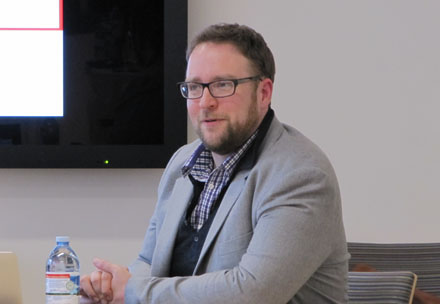
February 15, 2012 — Information consumption should be treated like a public health issue, said Clay Johnson, author of The Information Diet: A Case for Conscious Consumption, at a Shorenstein Center event moderated by Nicco Mele, Adjunct Lecturer in Public Policy.
“We are wired for what was good for us, rather than what is good for us,” said Johnson, applying the statement to both food consumption and media consumption. In both food and information supply, we have crossed the line “from scarcity to abundance,” he said.
Food companies have consolidated and shifted their focus on providing “cheap, popular calories,” said Johnson, because they want consumers to buy what they like, and “pizza tastes better than broccoli.” In the same way, media institutions have also shifted priorities to provide “cheap, popular information” rather than quality news, because “opinion ‘tastes’ better than news,” Johnson explained.
To combat an unhealthy information intake, Johnson proposes more “deliberate, conscious consumption” of news media. Just as a food journal can help you lose weight, Johnson said, keeping a “media journal is helpful to monitor what you’re taking in.”
Johnson urges media consumers to become “infovegans,” which means that they should be “actively trying to get to source material” and not rely on news and opinion handed down from media institutions. When news organizations like The New York Times write about a congressional bill but don’t link to the actual bill, Johnson said, it is “offensive” because it puts journalists in the position of making up the reader’s mind.
“Let’s make the slow news movement,” Johnson said, calling for more “deliberate consumers of news” to be mindful that “yesterday’s news is more important than today’s.”
By Janell Sims, Shorenstein Center.
Photos by Heather McKinnon, Shorenstein Center.

